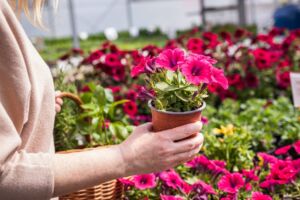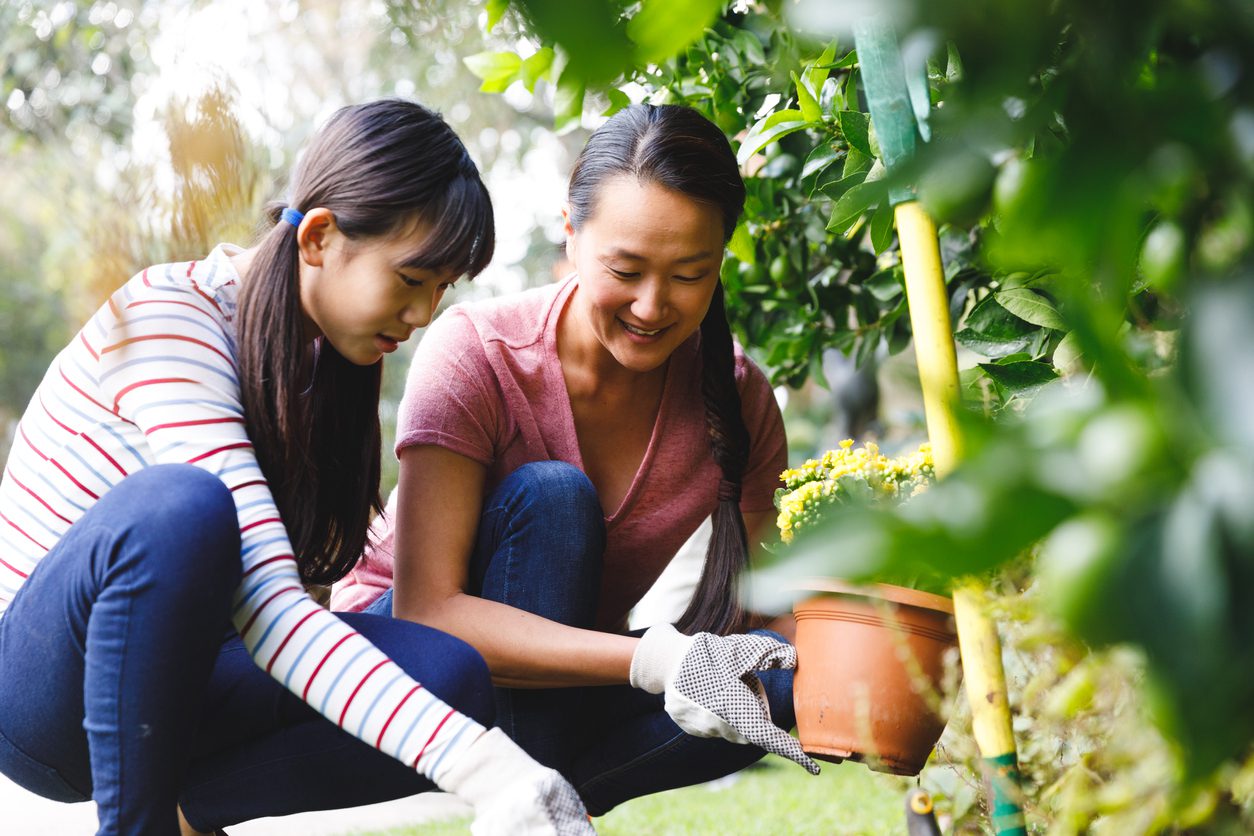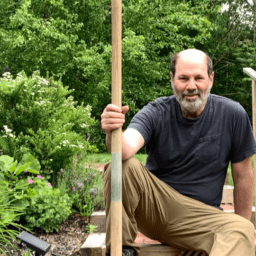Gardening offers a bounty of benefits for people with Parkinson’s, including mental and physical exercise, stress relief, and social connections. Whether you’re growing vegetables, herbs, or shrubs in borders, raised beds, or containers, and whether you have a green thumb or are just getting started, gardening can help you live well with Parkinson’s. In this article, we’ll take a look at how.
GARDENING EXERCISES YOUR BRAIN
Any time you start a new project, you’re asking your brain to focus and concentrate. This is true with gardening; to do it successfully, you must decide what to do, when to do it, and where to do it.
To get started, pick a favorite spot in your yard or inside your home and start to think about what you might enjoy planting there. Research what’s needed to start an herb garden for your windowsill, or investigate the varying levels of sunlight that reach certain areas of your yard or neighborhood garden. Search for online gardening groups, visit your local garden shop or nursery, or seek out local public gardens for inspiration. Make a list of the types of plants you might enjoy tending: flowers, herbs, vegetables, and/or fruits. Make a list of tools and supplies you might need. Begin a garden journal. Whether you’re sketching plans, taking photos, or researching seeds, you’re stimulating and exercising your brain.
GARDENING PROVIDES PHYSICAL EXERCISE
Research shows that every person living with Parkinson’s should establish a regular exercise routine to improve quality of life. Working in your garden provides an opportunity to exercise while engaging with and enjoying the outdoors. Because gardening requires the use of your hands and fingers, to perform many different tasks, you are strengthening your fine motor skills and building strength and flexibility. This type of exercise—moving your hands and fingers to grab, lift, pull, push, and press—can help minimize muscle cramping and dystonia.
 Tending your garden also requires you to stand, reach, sit, squat, bend, and twist. These types of movement are fantastic opportunities to stretch and strengthen all the muscle groups in your upper body, neck, arms, shoulders, and hips. Your body’s muscular framework, the core, also benefits from this type of movement and exercise. Strengthening your core will assist in better bowel and bladder control and can reduce heart rate and blood pressure. What better way to build more muscle, become more heart healthy, and relieve sore, aching muscles!
Tending your garden also requires you to stand, reach, sit, squat, bend, and twist. These types of movement are fantastic opportunities to stretch and strengthen all the muscle groups in your upper body, neck, arms, shoulders, and hips. Your body’s muscular framework, the core, also benefits from this type of movement and exercise. Strengthening your core will assist in better bowel and bladder control and can reduce heart rate and blood pressure. What better way to build more muscle, become more heart healthy, and relieve sore, aching muscles!
Remember, as always, to check with your care team before engaging in a new exercise program. (And, when it comes to gardening, remember too that you should stay hydrated, wear sunscreen, and take extra caution or ask for help when lifting or moving heavy items.)
GARDENING HELPS TO RELIEVE STRESS
Gardening can help manage stress in a variety of ways. To begin with, if you’re gardening outdoors (as opposed to inside, which comes with many perks as well!), you’ll receive the calming influence of time in the sun and in natural green spaces. In addition, watching your garden take shape provides great satisfaction and a sense of accomplishment. Take the time to enjoy the process of tending your garden, as this is a perfect way for you to be present and mindful and to practice these important skills. Allow your garden to become a peaceful refuge that assists you in managing your journey with Parkinson’s. Gardening is great for solo reflective time, a few hours with your partner, or a weekend activity for your entire family.
 Gardening can also offer you:
Gardening can also offer you:
- Time and space to meditate, allowing your brain to release stress, practice mindfulness, create, or relax
- A perfect place to practice breathing techniques
- Inner peace. Taking the time every day to walk outside and enjoy fresh air not only lowers blood pressure and slows your heart rate but gives you that much needed space to slow down and enjoy your surroundings
GARDENERS FIND SOCIAL CONNECTIONS
To live well with Parkinson’s, it’s essential to stay engaged with others and to socialize frequently. Gardening can help you do both. Many gardeners enjoy sharing ideas about their favorite roses or a new type of organic compost with other gardeners and find friendship in garden clubs and similar groups. Gardening is also a rewarding activity to do with friends, kids, and grandchildren, not only helping you feel better physically and mentally but also giving you special memories with your loved ones.
If you’re looking to build your gardening network, consider these ideas:
- Ask your church, community center, nursery, or home improvement store if they offer classes, help, and advice
- Community colleges often offer classes on various aspects of gardening, from composting and seasonal planting to design and fostering beneficial insects to help your garden thrive organically
- Ask your local nursery or volunteer center if there’s a community garden in your area. These local gems provide opportunities for social interaction and connection with like-minded people in a healthy environment
 As you can see, gardening provides numerous benefits for people with Parkinson’s. As the weather turns warmer and the days grow longer, try your hand (with or without a green thumb) at the activity, and notice the many ways it can help you live well.
As you can see, gardening provides numerous benefits for people with Parkinson’s. As the weather turns warmer and the days grow longer, try your hand (with or without a green thumb) at the activity, and notice the many ways it can help you live well.
Learn more about the outdoors and living well
How Sunlight Can Help You Live Well with Parkinson’s








